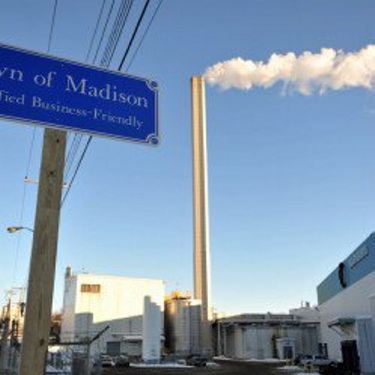The U.S. Department of Commerce is has opened an investigation into government subsidies received by a Canadian paper mill that led to temporary layoffs at Madison Paper Industries in January.
The investigation was announced in a news release by Maine Senators Susan Collins and Angus King and U.S. Rep. Bruce Poliquin, R-2nd District, Friday afternoon.
The subsidies allow the Nova Scotia mill to flood the U.S. market with paper, officials at the Madison mill and others in Maine have said, leading to layoffs and mill closings.
“For too long, these unfair subsidies have put Maine’s paper mills at a significant competitive disadvantage, threatening the jobs and livelihoods of far too many people across our state,” Collins, King and Poliquin said in the news release.
If the U.S. International Trade Commission determines that there is a reasonable indication that the Canadian imports materially injure or threaten to injure the U.S. industry, it could lead to higher import fees on paper imported from the Port Hawkesbury mill, to counteract the subsidies that firm receives from the government of Nova Scotia.
Hundreds of workers at the Madison mill were temporarily laid off in January when production was halted because of reduced demand.
Friday night, Madison Paper President Russ Drechsel said the investigation is part of a statutory timeline for responding to complaint petitions and was not unexpected.
“It’s moving forward as set by law,” he said.
In February, Madison Paper joined with Verso Corporation’s Duluth Mill in Duluth, Minn., in filing a complaint with Commerce Department and the International Trade Commission, arguing that government aid given to the Nova Scotia mill allowed it to undercut American producers with cheaper paper.
The mills produce supercalendered paper, which is used for magazines, catalogs, flyers and similar high-run publications. The U.S. mills claim a $125 million aid package from the Nova Scotia government to reopen the Port Hawkesbury mill in 2012 was an “unfair” subsidy that allowed the company to flood the U.S. market with paper more cheaply than the U.S. mills could.
In a conference with commission staff in Washington, D.C., on Thursday, Drechsel and other representatives of the Fair Paper Imports coalition testified, as did representatives of the Canada mill.
The session lasted about five hours, Drechsel said, adding that he “would not hazard a guess” on how the testimony was received by commission staff.
Attorneys for each side will file briefs by Tuesday. The timetable to the trade commission would mean a preliminary determination of injury to the U.S. businesses would be made by April 13. If it finds there was material injury, the investigation will continue and the Commerce Department could make a preliminary determination on possible duties in May.
A representative for the Port Hawkesbury mill did not return a phone call Friday.
When Madison Paper was forced to curtail production for two weeks in January, temporarily laying off more than 100 workers, company officials cited “unfair” competition from the Port Hawkesbury mill as the factor contributing to the slowdown.
Port Hawkesbury Paper representatives have made little public comment on the subsidy dispute, but have maintained that claims it violated World Trade Organization rules are false.
The U.S. government must be satisfied that the aid to the mill is made up of subsidies or assistance that would not be available to other businesses before it levies additional import fees on its imports.
Loss of business at the Madison mill has resulted in a decline of nearly $150 million in the value of the property for tax purposes, representing a drop of more than 20 percent in the town’s property tax base.
Copy the Story LinkSend questions/comments to the editors.



Success. Please wait for the page to reload. If the page does not reload within 5 seconds, please refresh the page.
Enter your email and password to access comments.
Hi, to comment on stories you must . This profile is in addition to your subscription and website login.
Already have a commenting profile? .
Invalid username/password.
Please check your email to confirm and complete your registration.
Only subscribers are eligible to post comments. Please subscribe or login first for digital access. Here’s why.
Use the form below to reset your password. When you've submitted your account email, we will send an email with a reset code.